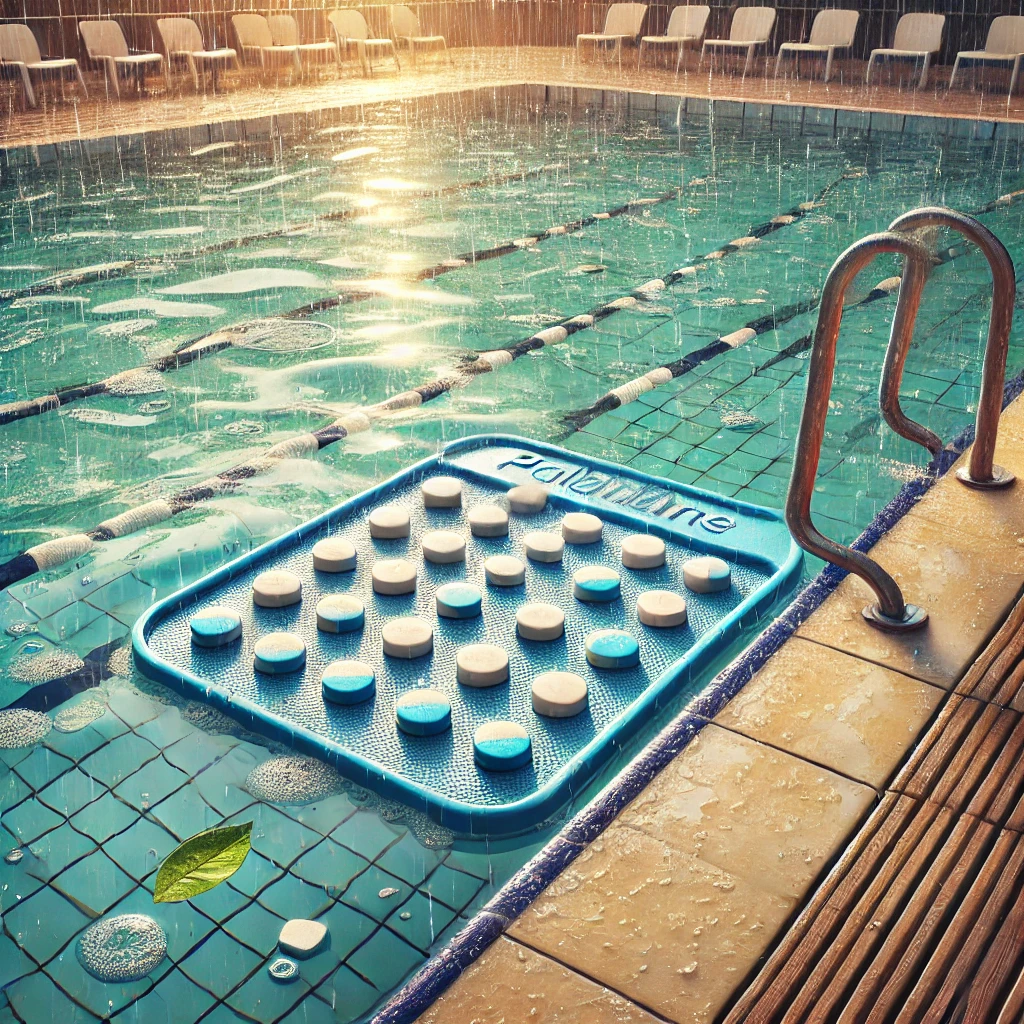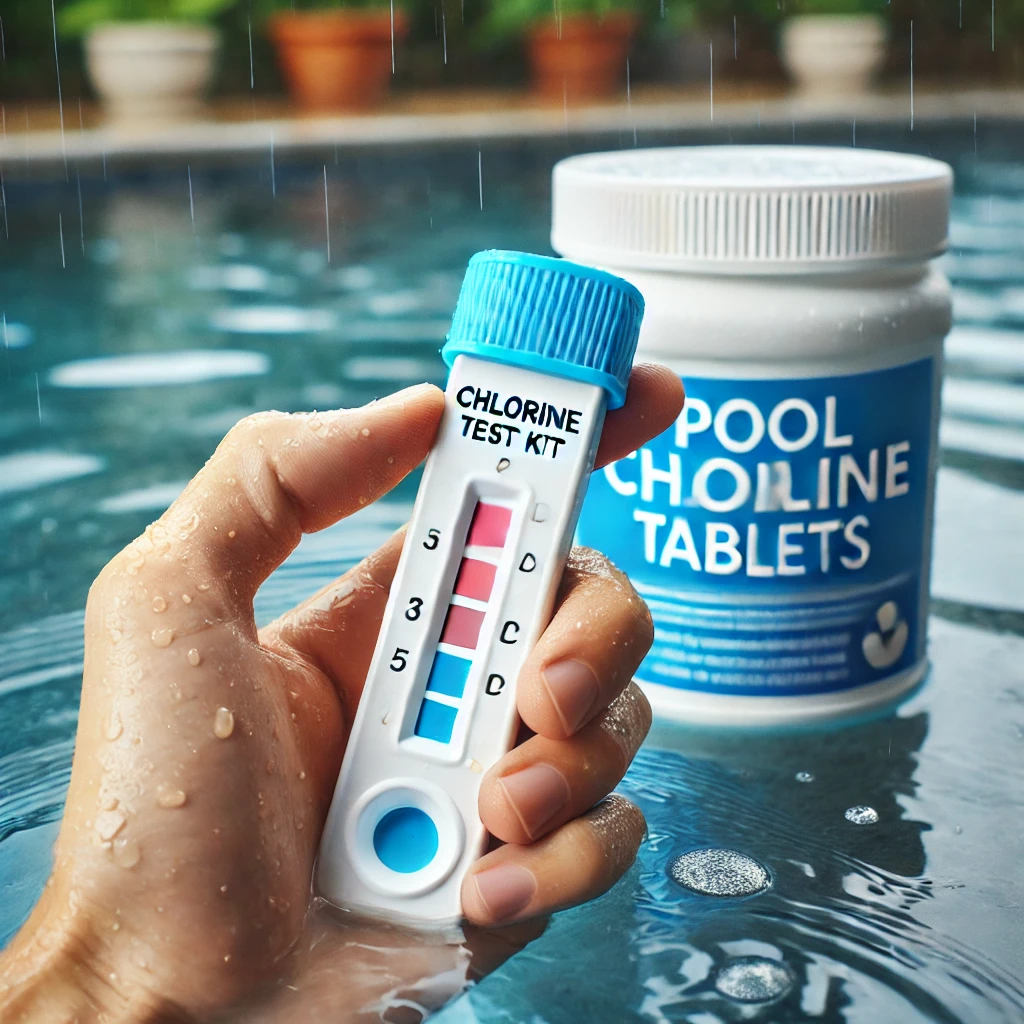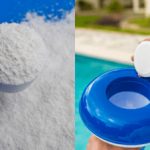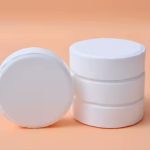Rain can significantly impact the chemistry of your pool. While rainwater may seem harmless, it can introduce contaminants and dilute your pool’s chlorine levels. Understanding why it’s essential to add pool chlorine tablets after rain will help maintain a safe and clean swimming environment.

I. Impact of Rain on Pool Water
Rainwater can alter the balance of your pool’s chemistry. As rain falls, it collects pollutants, debris, and organic matter from the atmosphere. When this rainwater enters your pool, it introduces these contaminants into the water. Additionally, rainwater is often acidic, which can lower the pH level of your pool. This combination of factors can reduce the effectiveness of the chlorine already present in the water.
II. Dilution of Chlorine Levels
One of the most significant effects of rain is the dilution of chlorine levels. Chlorine is crucial for keeping your pool water safe by killing bacteria and other harmful microorganisms. When rainwater enters the pool, it increases the water volume, thereby diluting the chlorine concentration. This dilution weakens the pool’s ability to combat contaminants effectively. To restore the proper chlorine balance, it’s essential to add pool chlorine tablets after rain.
III. Introduction of Contaminants
Rain doesn’t just dilute chlorine; it also introduces various contaminants into the pool. Organic matter, like leaves, dirt, and debris, can be washed into the pool by rain. These materials consume chlorine as they decompose, further lowering the chlorine levels. Additionally, pollutants from the atmosphere, such as dust, pollen, and even chemicals, can be carried into the pool by rain. These contaminants increase the demand for chlorine, making it necessary to add more pool chlorine tablets after rain.
IV. Lowering of pH Levels
Rainwater typically has a lower pH than your pool water. When rain enters the pool, it can lower the pool’s overall pH level, making the water more acidic. Acidic water can cause several problems, including corrosion of metal parts, skin irritation, and reduced effectiveness of chlorine. By adding pool chlorine tablets after rain, you not only replenish the chlorine levels but also help maintain a balanced pH, ensuring that your pool water remains safe and comfortable for swimmers.
V. Preventing Algae Growth
Algae thrive in warm, unbalanced water, especially when chlorine levels are low. After rain, when chlorine is diluted, and contaminants are introduced, your pool becomes an ideal environment for algae to grow. Algae can turn your water green and make surfaces slippery, posing a safety hazard. Adding pool chlorine tablets immediately after rain helps prevent algae from taking hold. The tablets provide a fresh supply of chlorine to combat potential algae growth before it becomes a significant problem.
VI. Maintaining Water Clarity
Clear, sparkling water is a sign of a well-maintained pool. Rainwater, however, can cloud your pool water, especially if it brings in dirt and debris. As these particles accumulate, they make the water look dull and uninviting. To restore water clarity after a rainstorm, adding pool chlorine tablets is crucial. The chlorine will work to eliminate the particles and microorganisms that cause cloudiness, helping to maintain the visual appeal of your pool.
VII. Ensuring Swimmer Health and Safety
Above all, maintaining proper chlorine levels is essential for the health and safety of swimmers. Insufficient chlorine can lead to the growth of harmful bacteria and viruses, increasing the risk of waterborne illnesses. After a rainstorm, the dilution of chlorine and the introduction of contaminants can create an unsafe swimming environment. Adding pool chlorine tablets after rain ensures that the water remains sanitized and safe for everyone who uses the pool.
VIII. Quick Recovery of Chemical Balance
After rain, it’s vital to restore the chemical balance of your pool as quickly as possible. Delaying the addition of pool chlorine tablets can allow contaminants to multiply, making it harder to bring the water back to a safe condition. By adding chlorine tablets promptly, you help your pool recover quickly from the effects of rain. This proactive approach minimizes downtime and keeps your pool ready for use.
IX. Practical Tips for Adding Chlorine Tablets After Rain
When adding pool chlorine tablets after rain, there are a few practical tips to keep in mind. First, always test your water before adding more chlorine. This will help you determine how much chlorine is needed to bring the levels back to normal. Use a floating chlorinator or place the tablets in a dispenser to ensure even distribution. Avoid placing the tablets directly into the skimmer basket, as this can cause localized over-chlorination and damage to your pool equipment.
X. Conclusion
Adding pool chlorine tablets after rain is crucial for maintaining a safe, clean, and enjoyable swimming environment. Rain can dilute chlorine levels, introduce contaminants, lower pH, and promote algae growth. By promptly adding chlorine tablets after rain, you restore the pool’s chemical balance, protect swimmer health, and ensure your pool remains clear and inviting. Regular maintenance and quick action after rain will keep your pool in top condition, ready for use at any time.
Rain can significantly impact the chemistry of your pool. While rainwater may seem harmless, it can introduce contaminants and dilute your pool’s chlorine levels. Understanding why it’s essential to add pool chlorine tablets after rain will help maintain a safe and clean swimming environment.
I. Impact of Rain on Pool Water
Rainwater can alter the balance of your pool’s chemistry. As rain falls, it collects pollutants, debris, and organic matter from the atmosphere. When this rainwater enters your pool, it introduces these contaminants into the water. Additionally, rainwater is often acidic, which can lower the pH level of your pool. This combination of factors can reduce the effectiveness of the chlorine already present in the water.
II. Dilution of Chlorine Levels
One of the most significant effects of rain is the dilution of chlorine levels. Chlorine is crucial for keeping your pool water safe by killing bacteria and other harmful microorganisms. When rainwater enters the pool, it increases the water volume, thereby diluting the chlorine concentration. This dilution weakens the pool’s ability to combat contaminants effectively. To restore the proper chlorine balance, it’s essential to add pool chlorine tablets after rain.
III. Introduction of Contaminants
Rain doesn’t just dilute chlorine; it also introduces various contaminants into the pool. Organic matter, like leaves, dirt, and debris, can be washed into the pool by rain. These materials consume chlorine as they decompose, further lowering the chlorine levels. Additionally, pollutants from the atmosphere, such as dust, pollen, and even chemicals, can be carried into the pool by rain. These contaminants increase the demand for chlorine, making it necessary to add more pool chlorine tablets after rain.
IV. Lowering of pH Levels
Rainwater typically has a lower pH than your pool water. When rain enters the pool, it can lower the pool’s overall pH level, making the water more acidic. Acidic water can cause several problems, including corrosion of metal parts, skin irritation, and reduced effectiveness of chlorine. By adding pool chlorine tablets after rain, you not only replenish the chlorine levels but also help maintain a balanced pH, ensuring that your pool water remains safe and comfortable for swimmers.
V. Preventing Algae Growth
Algae thrive in warm, unbalanced water, especially when chlorine levels are low. After rain, when chlorine is diluted, and contaminants are introduced, your pool becomes an ideal environment for algae to grow. Algae can turn your water green and make surfaces slippery, posing a safety hazard. Adding pool chlorine tablets immediately after rain helps prevent algae from taking hold. The tablets provide a fresh supply of chlorine to combat potential algae growth before it becomes a significant problem.
VI. Maintaining Water Clarity
Clear, sparkling water is a sign of a well-maintained pool. Rainwater, however, can cloud your pool water, especially if it brings in dirt and debris. As these particles accumulate, they make the water look dull and uninviting. To restore water clarity after a rainstorm, adding pool chlorine tablets is crucial. The chlorine will work to eliminate the particles and microorganisms that cause cloudiness, helping to maintain the visual appeal of your pool.
VII. Ensuring Swimmer Health and Safety
Above all, maintaining proper chlorine levels is essential for the health and safety of swimmers. Insufficient chlorine can lead to the growth of harmful bacteria and viruses, increasing the risk of waterborne illnesses. After a rainstorm, the dilution of chlorine and the introduction of contaminants can create an unsafe swimming environment. Adding pool chlorine tablets after rain ensures that the water remains sanitized and safe for everyone who uses the pool.
VIII. Quick Recovery of Chemical Balance
After rain, it’s vital to restore the chemical balance of your pool as quickly as possible. Delaying the addition of pool chlorine tablets can allow contaminants to multiply, making it harder to bring the water back to a safe condition. By adding chlorine tablets promptly, you help your pool recover quickly from the effects of rain. This proactive approach minimizes downtime and keeps your pool ready for use.
IX. Practical Tips for Adding Chlorine Tablets After Rain
When adding pool chlorine tablets after rain, there are a few practical tips to keep in mind. First, always test your water before adding more chlorine. This will help you determine how much chlorine is needed to bring the levels back to normal. Use a floating chlorinator or place the tablets in a dispenser to ensure even distribution. Avoid placing the tablets directly into the skimmer basket, as this can cause localized over-chlorination and damage to your pool equipment.

X. Conclusion
Adding pool chlorine tablets after rain is crucial for maintaining a safe, clean, and enjoyable swimming environment. Rain can dilute chlorine levels, introduce contaminants, lower pH, and promote algae growth. By promptly adding chlorine tablets after rain, you restore the pool’s chemical balance, protect swimmer health, and ensure your pool remains clear and inviting. Regular maintenance and quick action after rain will keep your pool in top condition, ready for use at any time.





